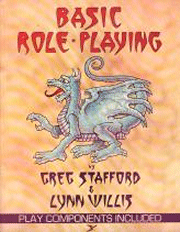
Basic Role-Playing (BRP) is a tabletop role-playing game which originated in the RuneQuest fantasy role-playing game. The BRP standalone booklet was first released in 1980 in the boxed set release of the second edition of RuneQuest. Greg Stafford and Lynn Willis are credited as the authors. A percentile skill-based system, BRP was used as the basis for most of the games published by Chaosium, including Call of Cthulhu, Stormbringer, and Elfquest.

The Generic Universal RolePlaying System, or GURPS, is a tabletop role-playing game system designed to allow for play in any game setting. It was created by Steve Jackson Games and first published in 1986 at a time when most such systems were story- or genre-specific.
Interactive fiction, often abbreviated IF, is software simulating environments in which players use text commands to control characters and influence the environment. Works in this form can be understood as literary narratives, either in the form of interactive narratives or interactive narrations. These works can also be understood as a form of video game, either in the form of an adventure game or role-playing game. In common usage, the term refers to text adventures, a type of adventure game where the entire interface can be "text-only", however, graphical text adventures still fall under the text adventure category if the main way to interact with the game is by typing text. Some users of the term distinguish between interactive fiction, known as "Puzzle-free", that focuses on narrative, and "text adventures" that focus on puzzles.

A live action role-playing game (LARP) is a form of role-playing game where the participants physically portray their characters. The players pursue goals within a fictional setting represented by the real world while interacting with each other in character. The outcome of player actions may be mediated by game rules or determined by consensus among players. Event arrangers called gamemasters decide the setting and rules to be used and facilitate play.
In multiplayer online games, a MUSH is a text-based online social medium to which multiple users are connected at the same time. MUSHes are often used for online social intercourse and role-playing games, although the first forms of MUSH do not appear to be coded specifically to implement gaming activity. MUSH software was originally derived from MUDs; today's two major MUSH variants are descended from TinyMUD, which was fundamentally a social game. MUSH has forked over the years and there are now different varieties with different features, although most have strong similarities and one who is fluent in coding one variety can switch to coding for the other with only a little effort. The source code for most widely used MUSH servers is open source and available from its current maintainers.
A massively multiplayer online role-playing game (MMORPG) is a video game that combines aspects of a role-playing video game and a massively multiplayer online game.

A role-playing game is a game in which players assume the roles of characters in a fictional setting. Players take responsibility for acting out these roles within a narrative, either through literal acting, or through a process of structured decision-making regarding character development. Actions taken within many games succeed or fail according to a formal system of rules and guidelines.

RPGnet is a role-playing game website. It includes sections on wargames, tabletop games and video games, as well as columns on gaming topics.
The Storytelling System is a role-playing game system created by White Wolf, Inc. for the Chronicles of Darkness, a game world with several pen and paper games tied in. The Storytelling System is largely based on the Storyteller System, the rule set used for White Wolf's other, older game setting, the World of Darkness.

Castle Falkenstein is a steampunk-themed fantasy role-playing game (RPG) designed by Mike Pondsmith and originally published by R. Talsorian Games in 1994. The game is named for a legendary unbuilt castle in the Bavarian Alps. Players play the roles of gallant adventurers who take on quests of intrigue and derring-do in the spirit of Victorian adventures such as The Prisoner of Zenda.

Action-adventure is a video game genre that combines core elements from both the action game and adventure game genres.

Discworld MUD is a popular MUD, a text-based online role-playing game, set in the Discworld as depicted in the Discworld series of books by Terry Pratchett.

A character sheet is a record of a player character in a role-playing game, including whatever details, notes, game statistics, and background information a player would need during a play session. Character sheets can be found in use in both traditional and action role-playing games. Almost all roleplaying games make use of character sheets in some fashion; even "rules-light" systems and freeform role-playing games record character details in some manner.

Furcadia is a free-to-play MMOSG/MMORPG or graphical MUD, set in a fantasy world inhabited by magical creatures. The game is based on user-created content with emphasis on world building tools, exploring, socializing, and free-form roleplaying. Furcadia hosts a large volunteer program called the Beekin Helpers, allowing players to help with community moderation, welcoming new players, handling in-game technical support, running in game events, creating art for the game itself, accessing and updating the game's website, and bug hunting. Furcadia holds the Guinness World Records title for the longest continuously running social MMORPG and in addition to being one of the first games to heavily encourage modding and let users build virtual worlds for themselves, it was also one of the first freemium online games. In 2008, Furcadia was reported as having over 60,000 players.
Freeform role-playing games, also called freeforms, are a type of role-playing game which employ informal or simplified rule sets, emphasise costume and theatricality, and typically involve large numbers of players in a common setting. Actions are typically adjudicated on the spot by a referee, though variants exist whereby players jointly mediate their own actions.

A play-by-post role-playing game is an online text-based role-playing game in which players interact with each other and a predefined environment via text. It is a subset of the online role-playing community which caters to both gamers and creative writers. Play-by-post games may be based on other role-playing games, non-game fiction including books, television and movies, or original settings. This activity is closely related to both interactive fiction and collaborative writing. Compared to other roleplaying game formats, this type tends to have the loosest rulesets.
An online text-based role playing game is a role-playing game played online using a solely text-based interface. Online text-based role playing games date to 1978, with the creation of MUD1, which began the MUD heritage that culminates in today's MMORPGs. Some online-text based role playing games are video games, but some are organized and played entirely by humans through text-based communication. Over the years, games have used TELNET, internet forums, IRC, email and social networking websites as their media.

Armageddon, frequently abbreviated Arm, is a low fantasy MUD – a text-based online role-playing game – set in a desert world called Zalanthas. It was founded in 1991 by Dan Brumleve, Nasri Hajj, and Santiago Zorzopulos in Urbana, Illinois. It requires its players to focus on role-playing.
An attribute is a piece of data that describes to what extent a fictional character in a role-playing game possesses a specific natural, in-born characteristic common to all characters in the game. That piece of data is usually an abstract number or, in some cases, a set of dice. Some games use different terms to refer to an attribute, such as statistic, (primary) characteristic or ability. A number of role-playing games like Fate do not use attributes at all.
The Cortex Plus System is a toolkit RPG system that evolved from Margaret Weis Productions, Ltd's Cortex System. It has been used for four published games and one published preview to date, and the design principles are in the Cortex Plus Hacker's Guide, a book of advice in how to create new games using Cortex Plus, and list of new games produced via Kickstarter. According to the Hacker's Guide there are three basic 'flavors' of Cortex Plus; Action, Drama, and Heroic.










